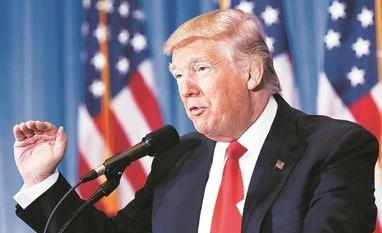Representatives from about 40 companies are expected to accompany President Donald Trump on the first presidential trade mission to China November 8-10 and sign deals for billions of dollars in US investments.
One of the biggest deals the Trump administration is currently negotiating is a multibillion-dollar energy investment from Chinese oil and gas giant China Petroleum & Chemical that would bring thousands of new jobs to hurricane-ravaged areas in Texas and the US Virgin Islands. Many of the deals, including the China Petroleum investment, are expected be in the form of nonbinding memorandums of understanding, not contracts.
Among the companies tentatively listed as working on China-related deals in conjunction with the trip, according to a government document obtained by Bloomberg News, are General Electric, Honeywell International, Westinghouse Electric, Alaska Gasline Development, the Boeing and Qualcomm. The companies represent a variety of sectors from life sciences to heavy machinery. Other companies that may have deals in progress, according to the document, include Cheniere Energy, Terex, Thermo Fisher Scientific, Applied Materials, Caterpillar and Blackstone Group.
Not all of the companies are expected to travel with Trump as part of the trade mission. A Caterpillar spokeswoman, Rachel Potts, said the company had not applied to participate.
Details of the project in the hurricane zones in Texas and the Virgin Islands are yet to be finalised, but the Chinese company, known as Sinopec, is expected to partner with ArcLight Capital, a Boston-based infrastructure investment firm, and Freepoint Commodities , a Connecticut commodity trading firm. The deal is expected to be worth more than $7 billion in investments in the US.
700-mile pipeline
The project would include construction of a 700-mile pipeline from the Permian oil field in western Texas to the Gulf Coast, as well as a storage facility there. Separately, Sinopec would expand the existing oil storage facility known as Lime Tree in St Croix, according to a person familiar with the proposal.
The deal will still need final approval from officials in both the US and China.
But all of these development deals may provide a political boost to the U.S. president, who focused much of his time on the campaign trail arguing that he was uniquely qualified to attract jobs and investment back to the US.
Commerce Secretary Wilbur Ross said the US hoped there would be “very good deliverables” during Trump’s visit when he visited China last month.
“We are looking forward to a very good session including a lot of American CEOs and we hope there will be some very good deliverables,” Ross told reporters.
Relations between the US and China have become strained as Trump has repeatedly criticised the country’s trade deficit and demanded Beijing act more forcefully to prevent the development of North Korea’s nuclear and ballistic missile programs.
Sale blocked
In September, the White House blocked the sale of US-based Lattice Semiconductor to a Chinese firm citing national security concerns, and a month earlier the president authorised an investigation into Chinese intellectual property theft. The administration is also weighing whether to impose penalties on Chinese aluminum foil imports amid accusations the product is being sold at below-market rates, though the Commerce Department said earlier this month they would delay its determination on the anti-dumping probe until after the president’s visit.
“I am very disappointed in China,” Trump posted on Twitter in July. “Our foolish past leaders have allowed them to make hundreds of billions of dollars a year in trade, yet they do NOTHING for us with North Korea, just talk. We will no longer allow this to continue. China could easily solve this problem!”
The White House hopes the trade mission will help smooth some of those tensions while providing Trump with a signature accomplishment he can tout to supporters.
Ahead of the trip, the US and China announced on Friday an agreement to recognise each other’s aircraft safety approvals. The deal may boost China’s aviation industry and make it easier for companies like Boeing to sell products there.
SinoPec impact
The SinoPec deal alone could reduce the trade deficit between the countries by as much as $10 billion a year, according to one person with knowledge of the negotiations. And the project’s focus on areas impacted by recent hurricanes could also provide a political benefit to the president, who has faced criticism over his handling of storm damage, particularly in Puerto Rico. Just 44 per cent of Americans approve of the president’s handling of the federal response to recent hurricanes, while 47 per cent disapprove, according to a CNN poll released Monday.
US firms selected as part of the delegation accompanying Trump to China also expect a boost in their business as well. More than 100 different companies applied to be part of the trade mission, with the administration expected to choose around 40 to send representatives to join Trump in Beijing. US officials are expected to announce which companies have been selected shortly.
Trump is expected to promote those companies throughout his trip, including during meetings with Chinese President Xi Jinping. Xi visited Trump’s golf resort in Mar-a-Lago in April for a meeting where the two leaders agreed to develop a “100-day plan” to reduce the trade deficit between the two countries and bolster American exports.
The president will likely emphasise US liquefied natural gas and its role in lowering the trade deficit, and negotiate for China to buy more LNG from the US in the future, two people familiar with the matter said.
Unlock 30+ premium stories daily hand-picked by our editors, across devices on browser and app.
Pick your 5 favourite companies, get a daily email with all news updates on them.
Full access to our intuitive epaper - clip, save, share articles from any device; newspaper archives from 2006.
Preferential invites to Business Standard events.
Curated newsletters on markets, personal finance, policy & politics, start-ups, technology, and more.
)